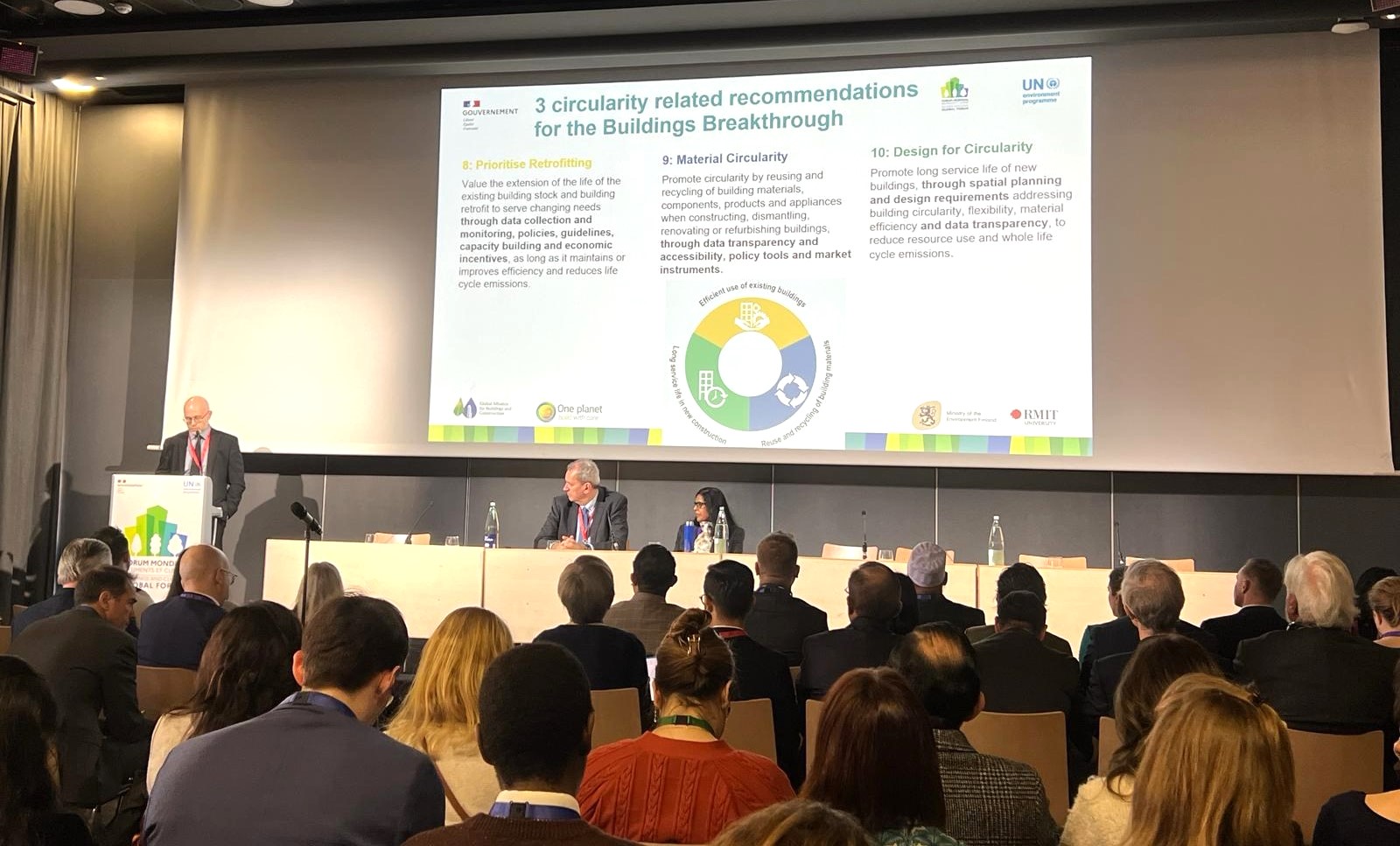New Circular Built Environment framework and key recommendations unveiled at Buildings and Climate Global Forum

As global leaders and practitioners gathered in Paris for the Buildings and Climate Global Forum, the Circular Built Environment group launched a new framework and key recommendations supporting the importance of circularity in the built environment.
The Buildings and Climate Global Forum, co-organised by France and the United Nations Environment Programme, with the support of the Global Alliance for Buildings and Construction, took place on 7-8 March 2024 in Paris and gathered for the first time ministers and high-level representatives of key organisations, to initiate a new impetus in international collaboration for building decarbonisation and resilience after the Conference of the Parties (COP) 28.
During this event, the Circular Built Environment group - led by the Ministry of the Environment Finland and RMIT University and operating under the Materials hub managed by GlobalABC, One Planet Network and Life Cycle Initiative - organised with the World Business Council for Sustainable Development a thematic session on the 'Circular economy in the built environment - A solution to the triple planetary crisis' on the 7th of March, with support from UNEP, Holcim, WorldGBC, UNOPS, UNIDO, and RMIT University.
The session raised awareness of the importance of circularity in the built environment and addressed challenges related to policy and market development encouraging the audience to focus on moving away from the linear model and instead committing to a circular economy model of the buildings and construction sector.
Three circular economy-related recommendations of the Ten Whole Life Cycle recommendations for the Buildings breakthrough were launched in the session: “8: Prioritise Retrofitting”, “9: Material Circularity” and “10: Design for Circularity” - representing different construction life cycle stages.
The 10 consensus driven recommendations were developed by the Materials Hub and its two parallel working groups Circular Built Environment that is led by the Ministry of the Environment Finland and RMIT university, and Whole Life Policy Coalition that is led by the UK’s Department of Energy Security through extensive stakeholder engagement including over 100 academic, policy and industry professionals from over 42 countries. To find our more please visit: https://globalabc.org/news/10-whole-life-cycle-recommendations-buildings-breakthrough
The Circularity assessment framework assessing the state of circularity of the built environment at the national level was also launched in the session. The Circularity assessment framework is funded by Finland, led by UNEP and developed by UNOPS. The piloting of the framework will start in Bangladesh this month by UN-Habitat. WBCSD also announced the launch of the Buildings CTI tool that assesses circularity at the buildings level in the session.
Launched with a call to action for countries to join in the piloting of the assessment framework, the Circular buildings assessment framework is under development with the support of 50 international advisors and the piloting country teams.
It will cover the categories of “Materials and Waste Flow”, “Environmental Footprint” and “Economic and Social Impact”. The final list of quantitative and qualitative indicators is being developed after three consultation sessions with an international advisory team.
The draft guidance and set of indicators will be piloted in Senegal and Bangladesh by UN-Habitat starting in May 2024. In Bangladesh, the team provided inputs into the assessment indicator framework developed by UNOPS, and consultants have been identified against different components of the project. The kick-off workshop has been scheduled for May 23rd, 2024. The stakeholder groups representing government agencies, professional bodies, academia, and other building sector players have been identified for engagement during the workshop and project implementation.
To find out more about these two assessment frameworks please visit: https://globalabc.org/resources/calls-for-proposals/call-pilots-circularity-frameworks


